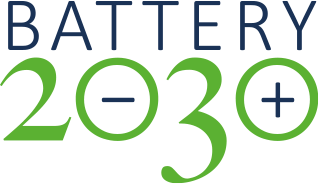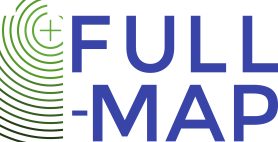Aims and goals
The FULL-MAP project (FULLy integrated, autonomous & chemistry agnostic Materials Acceleration Platform for sustainable batteries) aims to reinvent the way we discover new materials and interfaces. We propose a paradigm shift in battery innovation by developing a Materials Acceleration Platform (MAP) that redefines the limits of what is
possible. This transformative approach will revolutionize the way batteries are researched, designed, developed, processed, and characterized. The main goal is to accelerate the development of new battery chemistries with ultra-high performances by at least a factor of five compared to the current rate of discovery.
To achieve this, FULL-MAP relies on the development of a unique R&D infrastructure and accelerated methodology that integrates inverse design of materials and computational and experimental methods with Artificial Intelligence (AI), Big Data, Autonomous Synthesis, and extensive High-Throughput characterization and testing. FULL-MAP’s comprehensive and modular approach encompasses key analyses at various levels, from material to cell assembly. It simulates the entire battery development process, from material design to final battery testing, considering environmental and economic factors, significantly advancing sustainable battery technology. The entire workflow of the FULL-MAP solutions will be validated in 9 different use cases, demonstrating its versatility and chemical neutrality. In short, FULL-MAP aims to expedite high-performance battery development and implementation, bringing economic benefits to the EU industry and contributing to the decarbonization of the transportation, energy, and industrial sectors.
This groundbreaking initiative is coordinated by the Electrochemical and Surface Engineering Research group (SURF) at Vrije Universiteit Brussel (VUB) and involves 32 partners from across Europe. The Consortium includes 12 research centres and 5 universities with expertise in materials science, AI modelling, characterisation techniques, process optimisation, and sustainability assessments, 7 large enterprises and 5 small-to-medium enterprises bringing substantial resources, infrastructure, and industry experience; and 3 start-ups accelerating the development of breakthrough solutions within the battery sector.
The project started in February 2025 and will run for 4 years, having been awarded a total budget of €19.949.437, 40.
Concept and challenges
Battery technology has emerged as a key solution for cutting carbon dioxide emissions and transitioning away from fossil fuels in the energy, transport and industrial sectors. Nonetheless, new advancements are required to meet environmental targets and societal demands. In alignment with the strategies and EU initiatives such as the Batteries European Partnership Association (BEPA), European Battery Alliance (EBA) and Battery 2030+, the goal is to create batteries that are not only ultra-high-performance, but also durable, safe, sustainable, and cost-effective. So, a fundamental shift is required in our approach to discovering, developing, designing, and producing battery materials, components, and cells for practical use. Progress has traditionally relied on trial and error, and the expansion of MAPs across various disciplines has encountered specific obstacles in battery applications, resulting in a limited number of comprehensive MAP initiatives in this field (e.g., BIG-MAP).
Battery research faces unique challenges, including strict safety protocols and the need for extensive chemical diversity to optimize electrolytes and electrodes. The experimental exploration of cathode-electrolyte interphases (CEI) and solid electrolyte interphases (SEI) within MAPs also remains underdeveloped. Moreover, ensuring experimental consistency and device integration is crucial to reducing variability. Additionally, the complexity of battery systems makes scaling lab findings to commercial products difficult.
The FULL-MAP project has emerged to address these challenges and take a step forward in the discovery and optimization of next-generation batteries. It will develop the technical ecosystem (R&D infrastructure and methodology) to convincingly validate the potential of MAPs by integrating advanced multi scale computational modelling, materials synthesis, characterization, and testing, to significantly enhance the discovery of innovative battery interfaces, materials, and sustainable concepts that demonstrate high energy or power performance.
Objectives
01. Develop an interoperable data infrastructure for battery materials and interfaces capable of performing the autonomous acquisition, handling and analysis of data from all domains of the battery development cycle. This robust, FAIR-compliant system will enable efficient discovery, access, and reuse of critical data in the battery landscape.
02. Develop versatile toolkits for inverse design and scale-bridging models that leverage the latest advancements in Machine Learning (ML) and AI for orchestrated materials discovery, significantly accelerating multi-scale and multi-physics workflows. We aim to improve prediction accuracy by 25% over traditional models and reduce the time required for material property prediction by 40% compared to traditional methods, enhancing the overall efficiency and effectiveness of the battery development process.
03. Advance analytics methods, automated HT characterization modules and technologies for battery materials and interfaces. FULL_MAP will develop new computational and experimental techniques targeting increased spatial resolution, time domains, and in-situ and operando conditions to generate new insights into the construction of ultra-performing battery systems. We will go beyond the usual single-technique characterization schemes and obtain a more holistic vision.
04. Develop AI-orchestrated autonomous synthesis robotics to streamline and automate the closed-loop process of materials discovery. This comprehensive system aims to drastically reduce process times and enhance predictive capabilities, propelling significant advancements in battery technology development and performance assessment.
05. Disseminate knowledge to boost EU advanced battery development, manufacturing and market opportunities. The project will foster international cooperation by the participation and organisation of communication and dissemination events such as those organised by Battery 2030+ initiatives, and assess exploitation routes for its innovations. By aligning exploitation strategies with European regulations and market needs, FULL-MAP will create new opportunities across the battery value chain.
Electrochemical and Surface Engineering Research group (SURF) at Vrije Universiteit Brussel (VUB), Belgium.
Project coordinator: Dr. Mesfin Haile Mamme
Email: Mesfin.Haile.Mamme@vub.be


